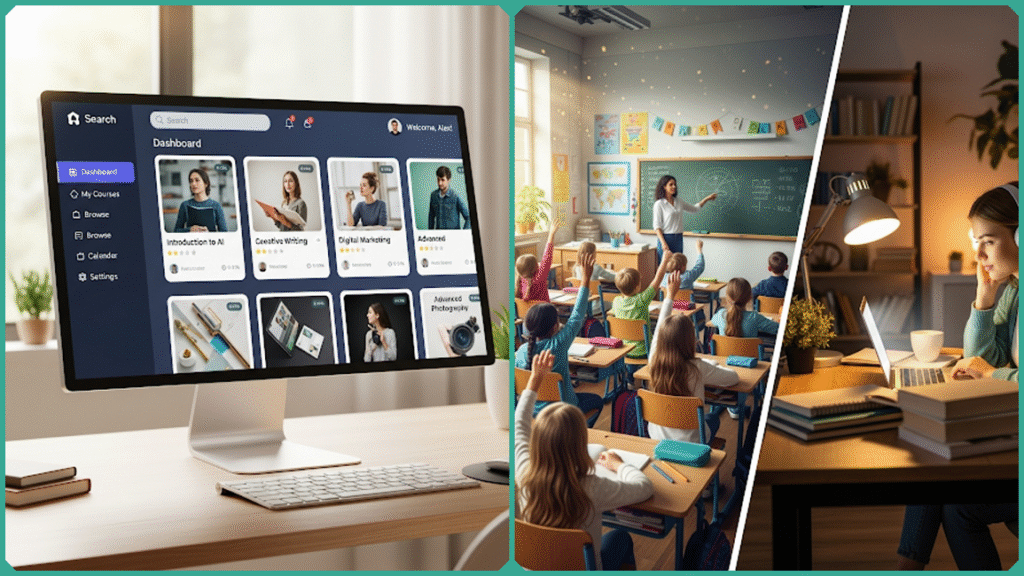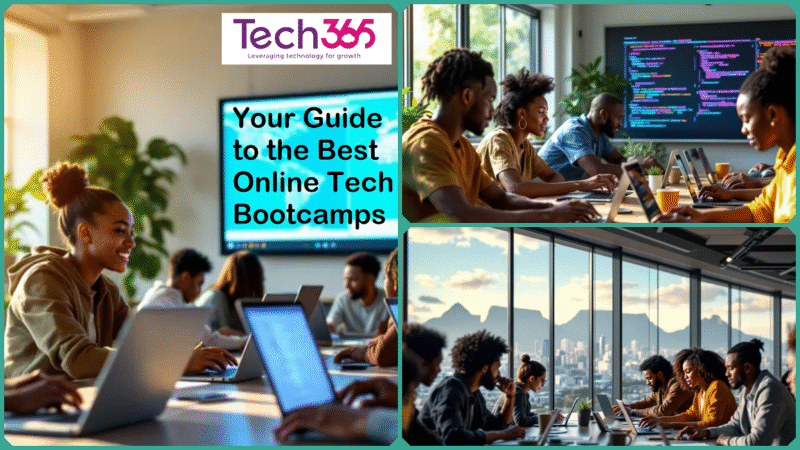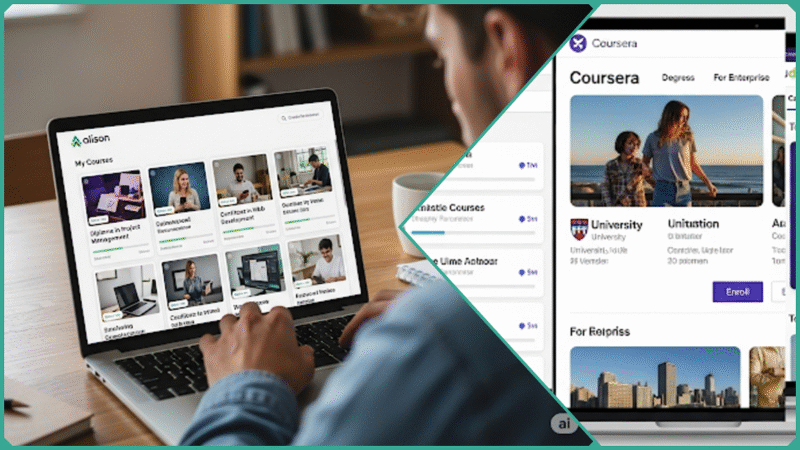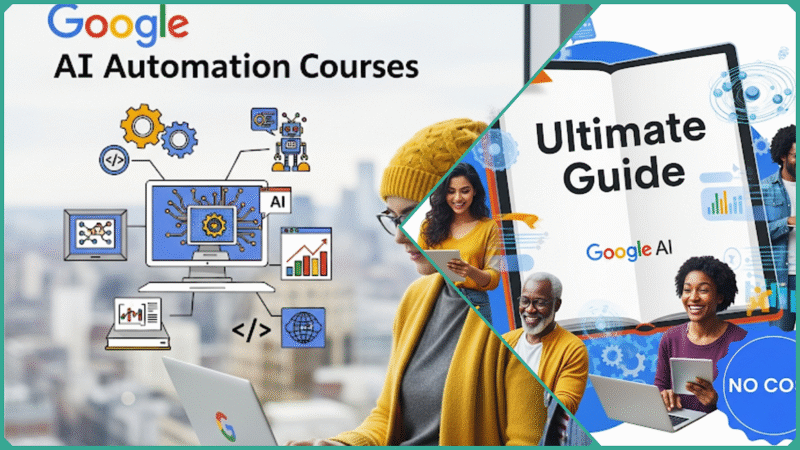Is LinkedIn Learning and Online Courses Replacing Colleges?
Estimated reading time: 19 minutes
Platforms such as LinkedIn Learning have experienced a significant surge in popularity as highly flexible and affordable methods for individuals to acquire new skills and advance their careers, particularly in the technology sector, over the past several years. This growing trend prompts a thought-provoking and important question:
Are online courses and digital learning platforms such as LinkedIn Learning gradually replacing traditional colleges and universities as the primary means of education?
With the rapid advancement of technology and the increasing accessibility of the internet, many people are turning to these flexible and affordable online resources to gain new skills and knowledge. While traditional colleges offer a comprehensive educational experience, online platforms provide an alternative that is often more convenient and tailored to individual needs.

This shift has sparked a significant debate about the future of higher education and whether online learning can fully substitute the value and depth provided by conventional academic institutions. With rising tuition costs, evolving job market demands, and more emphasis on skills over degrees, many students, career changers, hiring managers, and lifelong learners are rethinking the value and role of a college education.
This post explores the intricate and multifaceted relationship between LinkedIn Learning, the evolving landscape of online education, and traditional colleges and universities. It offers valuable insights and thoughtful analysis for anyone who is invested in understanding the future of education, career advancement, and professional development in an increasingly digital world.
Understanding LinkedIn Learning and Traditional Colleges
LinkedIn Learning is a leading online educational platform that offers more than 16,000 expert-led video courses in business, technology, and creative fields. It is designed to provide flexible, on-demand learning tailored especially for busy professionals or students seeking to gain specific, practical skills.
Typical courses are concise, episode-style videos—often less than five minutes each—that can be completed at one’s own pace. Learners receive certificates of completion that integrate directly into LinkedIn profiles, enhancing professional visibility.
The platform continuously updates content to keep pace with industry trends and skill demands, focusing primarily on job-ready abilities such as software proficiency, project management, and leadership development. Pricing is subscription-based, generally far more affordable than traditional education, and includes options for monthly or annual payment plans.
In contrast, traditional colleges offer structured degree programs that typically require several years of study. These programs cover a broad curriculum combining theoretical frameworks, foundational knowledge, and applied learning across many disciplines.
Alongside academic content, colleges provide social experiences, extensive networking opportunities, and credentials widely recognized—in many cases, legally required—for certain professions such as law, medicine, engineering, and academia.
College education often emphasizes deep critical thinking, comprehensive problem-solving skills, and intellectual growth that extends beyond immediate job skills. The traditional college experience is generally more costly and less flexible, involving fixed schedules, compulsory attendance, and campus life.
However, it ultimately culminates in the awarding of degrees that have long served as enduring markers and symbols of significant educational achievement and academic accomplishment.
Core Differences Between LinkedIn Learning and Traditional Colleges
| Feature | LinkedIn Learning | Traditional Colleges |
|---|---|---|
| Content Focus | Practical, job-ready skills (business, tech, creative) | Broader theoretical and applied academic study |
| Learning Format | Video-based, self-paced, modular | Classroom-based, structured, multi-year programs |
| Credential Type | Certificates of completion, LinkedIn profile badges | Accredited degrees (Associate’s, Bachelor’s, Master’s, PhD) |
| Flexibility | High—anytime, anywhere learning | Low—fixed schedules, geographic constraints |
| Cost | Subscription-based, generally affordable | High tuition and additional fees |
| Social & Network Access | Limited to online communities and LinkedIn networking | In-person social, extracurricular activities, and alumni networks |
| Recognition | Growing acceptance in the industry, especially tech | Widely recognized across industries and professions |
The decision between LinkedIn Learning and a traditional college education depends on individual goals. LinkedIn Learning provides an accessible, cost-effective way to acquire up-to-date skills aligned with fast-evolving careers, especially in technology and business sectors.
Conversely, traditional colleges provide a much more comprehensive education along with recognized credentials that are absolutely crucial for many professions requiring formal accreditation. In addition to the professional qualifications, these institutions also offer opportunities for deeper personal growth and more extensive academic development, fostering a well-rounded experience beyond just the classroom.
Such clear distinctions play a crucial role in helping graduates, individuals looking to change careers, employers, and educators gain a deeper understanding of where and how each educational mode truly excels. They also clarify why these different modes often work best when they complement each other rather than serve as outright replacements. This insight allows all parties involved to make more informed decisions about educational pathways and career development strategies.
Key Educational Concepts and Frameworks
To truly understand how modern learning platforms like LinkedIn Learning are influencing education, we must first look at the key educational concepts and frameworks that have long defined our approach to skill acquisition.
Let us take a closer look and thoroughly explore the traditional models that have been widely used for many years, as well as the innovative new paradigms that are now emerging to gradually replace them in various fields and industries.
Online Learning and Micro-Credentialing
Micro-credentialing represents a transformative approach in education, epitomized by platforms like LinkedIn Learning. Unlike traditional multi-year degree programs, micro-credentials are shorter, focused certifications that validate specific job-relevant skills.
These bite-sized credentials enable learners to acquire practical competencies quickly, often through modular online courses that can be completed flexibly around other commitments. Micro-credentials are more affordable, stackable, and accessible than traditional degrees, making them ideal for professionals who need agility in learning to keep pace with evolving industry demands.
These credentials often come as digital badges or certificates that can be displayed on professional profiles and resumes, immediately signaling to employers the learner’s capability in targeted areas such as data analytics, programming languages, or project management.
Importantly, micro-credentialing plays a crucial role in supporting a just-in-time learning model by effectively addressing and closing skills gaps promptly. This approach enables learners to acquire specific competencies quickly and efficiently, without the need for the extended time commitment and significant financial investment typically associated with traditional, long-term educational programs.
Skills-Based Hiring and Lifelong Learning
Today’s rapidly evolving job market increasingly prioritizes skills over formal degrees, a shift particularly pronounced in technology and other dynamic sectors. Employers seek validated, real-world competencies that can be immediately applied, rather than relying solely on traditional academic qualifications.
This paradigm shift is driving the adoption of skills-based hiring practices, where micro-credentials and online course certifications hold growing value. Complementarily, the principle of lifelong learning is gaining importance as workers must continuously update their skills to remain competitive.
Platforms like LinkedIn Learning excel here by providing industry-relevant, up-to-date content that professionals can access anytime throughout their careers. The democratization of education through such accessible, continuous learning tools empowers individuals to take ownership of their development, adapting to technological changes and new career opportunities smoothly.
Value of Traditional Degrees
Despite the rise of alternative credentials, traditional college degrees still carry significant value. Degrees offer comprehensive foundational knowledge and foster critical thinking skills that underpin complex problem-solving abilities. They often provide broad intellectual development beyond specific job training.
Moreover, academic degrees continue to be fundamentally essential for pursuing many professional careers, particularly those that are heavily regulated or require a profound and comprehensive understanding of theoretical knowledge, such as fields like medicine, law, and engineering. These degrees provide the necessary foundation and credentials that are crucial for success and credibility in these specialized professions.
In addition to academic instruction, colleges facilitate important personal growth, networking opportunities, and social experiences that contribute to long-term career success and professional identity formation. For sectors valuing these broader educational experiences and formal accreditation, college degrees continue to be the gold standard.
This balanced framework highlights how micro-credentialing and online learning are reshaping skill acquisition and workforce readiness, while traditional degrees maintain their foundational and credentialing importance in many fields. Together, these concepts frame the evolving landscape of education and career development in today’s economy.
Current Trends and Developments
The educational landscape is in constant flux, driven by rapid technological advancements and changing workforce demands. We will explore the current trends and developments that are reshaping how we learn and acquire new skills, from the rise of specialized credentials to the integration of new technologies.
Integration of LinkedIn Learning in Universities
Rather than purely competing with traditional education, many universities are increasingly integrating LinkedIn Learning into their curricula to enrich their teaching methods and provide students with practical, industry-aligned skills.
For example, Lambton College in Ontario actively promotes LinkedIn Learning by curating themed course playlists tailored to academic programs, encouraging peer advocacy, and embedding relevant LinkedIn Learning content directly into academic pathways. This integration allows students to complement their academic foundation with job-ready skills, improving their employment prospects upon graduation.
Similarly, West Coast University (WCU) has partnered with LinkedIn Learning to integrate its extensive course library into core business administration programs such as BSBA and MBA. Through single sign-on access, students at WCU select LinkedIn Learning courses aligned to their curriculum, complete them flexibly, and submit certificates of completion for academic credit.
This approach provides personalized, flexible learning experiences while fostering professional presence by enabling students to showcase certificates on their LinkedIn profiles. Faculty and staff are also encouraged to engage alongside students, creating a culture of lifelong learning within the academic community.
Technological integrations such as single sign-on (SSO) and automated content catalog sync through systems like Degreed further facilitate seamless access to LinkedIn Learning content within university learning management systems. These integrations ensure that content is always current, easily discoverable, and measurable via advanced reporting capabilities, enhancing both administration and learner experience.
Growing Acceptance of Online Learning
Attitudes toward online learning have undergone a significant and notable shift in recent years. A comprehensive and detailed survey conducted by the University of Potomac revealed that an impressive 77% of educators now believe that online learning, when it is thoughtfully and carefully designed, can be just as effective or even more effective than traditional classroom-based teaching methods.
Several key factors are driving this growing acceptance and positive perception, including the increased flexibility that online learning offers, its broad accessibility to a wider range of students, and the unique ability it provides to tailor and target educational content specifically to address individual skill gaps and learning needs.
Platforms such as LinkedIn Learning are especially appealing to individuals who are changing their careers as well as professionals seeking to enhance their skills in technology-related fields, due to several key advantages, including:
- On-demand access
- Modular course structure
- Up-to-date content reflecting industry trends
- Personalized learning recommendations powered by AI are linked to users’ career interests
Employers also highly value the agile, skills-focused upskilling opportunities that online learning platforms offer to their workforce, recognizing how these platforms effectively complement and enhance traditional education methods. This appreciation further validates the important role that online learning plays in developing employee skills in a flexible and targeted manner.
Together, these trends indicate a shift toward a hybrid education model, where traditional colleges and online platforms complement each other, combining foundational academic rigor with practical skill acquisition relevant to today’s fast-evolving careers.
Pros and Cons Comparison: LinkedIn Learning vs Traditional Colleges
Here is a thorough and highly detailed pros and cons comparison of LinkedIn Learning versus traditional colleges, presented in a well-organized and easy-to-understand table format, along with additional explanations and context to help clarify and expand on each point:
| Aspect | LinkedIn Learning & Online Courses | Traditional Colleges |
|---|---|---|
| Cost | Generally low cost or free via employer/university subscriptions. Subscription plans are around $39.99/month, significantly more affordable than traditional tuition. | High tuition fees are combined with additional costs such as room, board, textbooks, and commuting expenses. Overall financial burden is much higher. |
| Flexibility | Learn anytime, anywhere, at your own pace with modular courses. Ideal for working professionals and those balancing other commitments. | Fixed schedules, usually location-dependent with mandatory attendance, are less accommodating for flexible study times. |
| Depth of Study | Focused, short courses targeting specific practical skills with an emphasis on immediate application in the workplace. Content is frequently updated. | Comprehensive curricula that combine theoretical knowledge with applied learning over several years, fostering critical thinking and intellectual development. |
| Credential Recognition | Certifications and micro-credentials are increasingly valued in some industries, particularly tech, but generally less formal and not always universally accepted as degrees. | Widely recognized degrees—Associate’s, Bachelor’s, Master’s, and PhDs—that are often required for regulated professions and convey formal academic achievement. |
| Social & Network Experience | Limited social interaction, primarily networking via LinkedIn’s platform and online communities; lacks traditional campus life and in-person peer engagement. | Extensive opportunities for socializing, campus involvement, building lifelong friendships, and networking through clubs, events, and alumni connections. |
| Career Support | Immediate skill upgrades aligned with current job market demands and direct integration with LinkedIn profiles for job visibility. Less formal career counseling. | Broader career services, including internships, job placement, in-person mentoring, and foundational education, prepare students for varied career paths. |
Additional Insights
- Cost Impact: Online learning significantly reduces not only tuition expenses but also various indirect costs, including commuting, housing, and other day-to-day expenses, making education far more accessible and affordable to a broader range of learners. This financial benefit allows many students to pursue their studies without the heavy burden of additional living costs. However, despite these savings, the comprehensive campus experience provided by colleges—including social interactions, extracurricular activities, and on-site resources—often justifies the higher expenses for many students who are looking for a well-rounded growth environment that supports their academic and personal development.
- Flexibility Advantage: The asynchronous learning format offered by LinkedIn Learning significantly empowers learners by giving them complete control over their own schedules. This flexibility is particularly valued by adult learners and busy professionals who often juggle multiple responsibilities. In contrast, traditional colleges typically require more structured and rigid time commitments, such as fixed class schedules and mandatory attendance, which can pose considerable challenges for individuals balancing work duties or family obligations. This makes LinkedIn Learning a more adaptable and accessible option for those needing to fit education around their existing commitments.
- Recognition Nuances: While LinkedIn Learning certificates significantly enhance resumes and LinkedIn profiles by showcasing ongoing professional development, traditional college degrees continue to play a crucial and often indispensable role for professions that require formal qualifications and accreditation. Increasingly, a growing number of employers are recognizing the value of combining both credentials, viewing them as complementary indicators of a candidate’s readiness, adaptability, and commitment to continuous learning in a rapidly evolving job market.
- Career Development: LinkedIn Learning’s seamless integration with professional profiles enables individuals to quickly and effectively showcase their most up-to-date skills and knowledge to prospective employers, making it an exceptionally relevant tool for those committed to continuous learning and skill advancement. On the other hand, traditional colleges offer a more extensive and structured career development framework that often includes valuable opportunities such as internships, mentorship programs, and access to robust alumni networks, all of which can be particularly beneficial and influential in certain industries and professional fields.
This comparison highlights the continuously evolving landscape of education, where modern online platforms such as LinkedIn Learning provide learners with highly cost-effective, flexible, and specifically targeted learning opportunities.
At the same time, traditional colleges continue to play an essential role by offering deep academic foundations, widely recognized credentials, and valuable social development experiences that are difficult to replicate through online formats.
Impact on Hiring Practices
Hiring managers and business leaders are increasingly recognizing and valuing the skills demonstrated through online courses, such as those offered by LinkedIn Learning, as essential components in their hiring and employee development strategies.
This growing appreciation reflects a broader industry trend toward skills-based hiring, where validated competencies, practical knowledge, and a commitment to continuous learning are becoming far more critical than relying solely on traditional degree credentials.
This significant shift clearly highlights how modern organizations are increasingly prioritizing practical, real-world skills and the ability to adapt swiftly and effectively in an ever-changing and rapidly evolving job market environment.
LinkedIn Learning’s Role in Workforce Development
LinkedIn Learning has become an increasingly valuable and essential tool for organizations looking to efficiently upskill and reskill their employees. Many forward-thinking companies actively incorporate LinkedIn Learning into their comprehensive learning and development programs to effectively close skill gaps, especially those related to rapidly emerging technologies, leadership capabilities, and other highly sought-after skills in today’s competitive market.
According to LinkedIn’s 2025 Workplace Learning Report, employers who prioritize and invest in employee career development through platforms like LinkedIn Learning consistently observe significantly improved business outcomes, including notably higher levels of employee engagement, increased retention rates, and overall enhanced organizational performance.
Skills-Based Hiring Gains Ground
Recruiters and talent acquisition professionals are increasingly adopting skills-based hiring techniques as a more effective way to match candidates’ actual capabilities with the specific requirements of open job positions.
LinkedIn data reveals that hiring teams frequently use micro-credentials and certificates earned through online learning platforms such as LinkedIn Learning as valuable evidence of candidates’ relevant skills and their ongoing commitment to professional growth and continuous learning.
This trend has gained significant momentum, especially within technology-related fields where practical, hands-on skills in areas like artificial intelligence, data analytics, cloud computing, and various programming languages are experiencing particularly high demand from employers.
AI and Data-driven Recruiting
AI-powered tools seamlessly integrated within LinkedIn’s comprehensive recruiting platform assist recruiters in rapidly identifying candidates who possess the most relevant skills by analyzing not only traditional resumes but also learning achievements, endorsements, and various profile activities on LinkedIn.
This advanced technology significantly empowers recruiters by enabling them to make faster, more accurate, and well-informed hiring decisions with a much higher level of confidence and assurance throughout the entire recruitment process.
According to LinkedIn’s 2025 Future of Recruiting report, talent professionals who effectively leverage AI experience approximately a 20% reduction in their overall workload while simultaneously achieving higher quality hires and improved recruitment outcomes.
Candidate Experience and Employer Branding
LinkedIn Learning certifications significantly enhance candidates’ employability by enabling them to prominently showcase their most current and relevant skills directly on their LinkedIn profiles. This increased visibility helps make candidates more attractive and noticeable to recruiters who are actively searching for qualified professionals.
Additionally, companies gain substantial advantages by positioning themselves as forward-thinking learning organizations that prioritize and support continuous employee development and growth. This commitment to fostering a culture of ongoing learning helps attract top-tier talent who highly value opportunities for professional growth and skill advancement within their workplaces.
Traditional Degrees Still Relevant, But Complemented
Although the importance of academic degrees continues to remain very strong in many industries, particularly within highly regulated professions, they are increasingly viewed as just one important element among several factors used to assess a candidate’s overall fit for a position.
The rapidly evolving and constantly changing professional landscape strongly suggests that traditional degrees and online credentials will not only continue to coexist peacefully but also complement and enhance each other in meaningful ways.
Platforms such as LinkedIn Learning serve an essential and increasingly important role in bridging the significant gap that exists between traditional formal education and the ever-growing demand for lifelong, on-the-job skill development.
These platforms provide robust support for continuous learning and ongoing professional growth throughout an individual’s entire career journey. They play a crucial role in helping workers remain relevant and competitive, especially in industries that are rapidly evolving and constantly changing.
By offering up-to-date resources and tailored learning paths, these platforms empower professionals to adapt to new trends and technological advancements, ensuring long-term career success and resilience in dynamic job markets.
In Summary
LinkedIn Learning is significantly reshaping and transforming traditional hiring practices by enabling organizations to place a much greater emphasis on demonstrable skills and practical competencies. It encourages continuous and lifelong learning among employees, fostering a culture where ongoing development is highly valued.
Additionally, it leverages advanced AI-enhanced insights and data analytics to help employers make more informed and effective talent decisions. This innovative approach does not completely replace the importance of traditional academic degrees but rather complements and enhances them, especially in today’s rapidly evolving and fast-changing job market, where skills and adaptability are crucial.
FAQs
Can LinkedIn Learning replace a college degree?
LinkedIn Learning offers practical skills training but does not confer accredited degrees. For many regulated professions requiring formal education, a college degree remains indispensable. However, for acquiring tech skills, leadership abilities, or ongoing professional development, LinkedIn Learning serves as a valuable and cost-effective complement or alternative to traditional education.
How credible are LinkedIn Learning certifications?
While they do not carry the same academic weight as degrees, LinkedIn Learning certificates are increasingly recognized by employers, especially when part of a broader portfolio demonstrating relevant skills and experience. They indicate current knowledge in specific areas and practical capabilities, enhancing professional profiles and job market visibility.
Is online learning effective for career changers?
Online platforms like LinkedIn Learning allow career changers to acquire in-demand skills flexibly and affordably. This makes transitions into new fields more feasible without the time and financial investment required for full degree programs. The practical, real-world focus of courses accelerates job readiness.
What about social interaction and networking?
Traditional colleges offer richer social experiences and in-person networking through campus life, clubs, and alumni connections. LinkedIn Learning connects professionals digitally via LinkedIn, empowering networking through profiles, groups, and endorsements, but lacks the immersive community experience of a physical college environment.
How do employers view candidates with online learning credentials?
Employers increasingly value candidates who demonstrate continuous learning and up-to-date skills via online certifications, particularly in fast-evolving tech roles. While some roles and industries still prioritize formal degrees, online credentials are becoming important indicators of adaptability and commitment to professional growth.
In Conclusion
LinkedIn Learning and online courses are not outright replacements for traditional colleges but rather complementary forces reshaping education. They excel in affordability, flexibility, and skills relevance, making them ideal for career changers, upskillers, and lifelong learners, particularly in tech. Traditional colleges remain crucial for foundational knowledge, critical thinking, and fields requiring degrees for practice.
The future likely holds a hybrid model with more universities embedding online learning resources like LinkedIn Learning into their curricula and employers adopting broader hiring criteria inclusive of diverse credentials. For students and professionals, the best approach depends on individual goals, budgets, fields of interest, and readiness to embrace lifelong learning.
Exploring LinkedIn Learning can unlock immediate skills with ROI, while pursuing traditional college degrees can provide deep expertise and recognized qualifications. Together, they represent a dynamic, evolving educational ecosystem catering to diverse career paths and learners.
Discover more from Skill to Grow
Subscribe to get the latest posts sent to your email.






